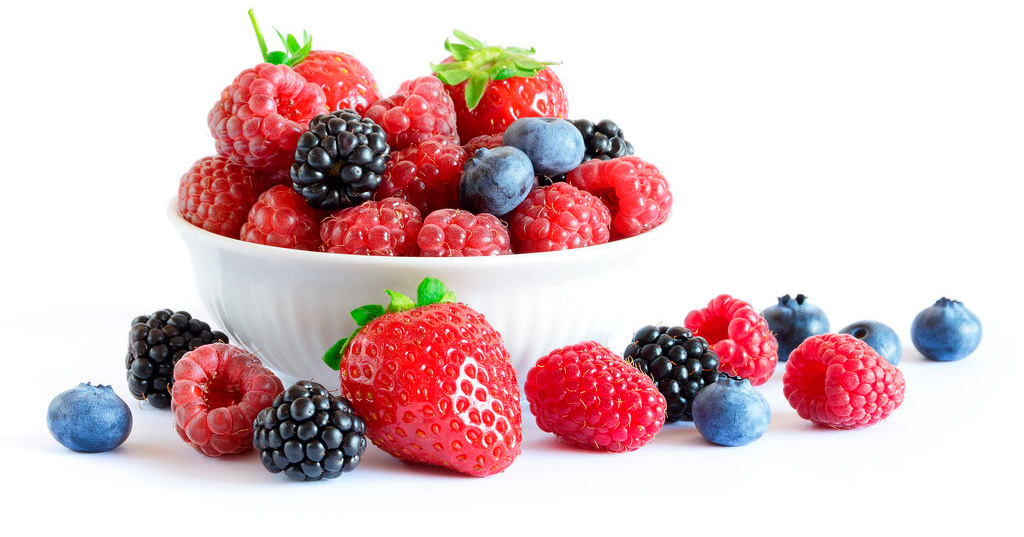There is a whole world of fruits beyond apples, bananas and pears that, aside from being delicious, have such great nutritional qualities that prestigious university studies have certified them as important products for the prevention and treatment of a variety of ailments.

BERRIES FOR
HEALTH


BENEFITS
They don’t stand out just for
for their delicious flavor, they
feature some very beneficial qualities.
Studies on berries and other fruits with high antioxidant content have demonstrated benefits in the fight against diseases like:
Blackberries
This wonderful little black fruit demonstrates a wide range of health benefits. In the laboratory, blackberry extract helps induce the self-destruction of breast, colon and prostate cancer cells. This fruit also has a significant antibacterial effect. It has been shown to prevent oxidation caused by ultraviolet light (UV), to protect the liver from free radical damage and to reduce inflammation. It has also been shown to have a protective effect on blood vessels. Finally, several epidemiological studies provide evidence that increased dietary intake of lutein and zeaxanthin (carotenoids identified in blackberry pulp) is associated with a lower risk of age-related macular degeneration, a disease of the eyes common among the elderly.
Strawberries
Sweet and juicy strawberries, with their vibrant red color, can brighten the taste and appearance of any food. They are not only delicious, they are also low in fat and calories, and a good source of fiber containing antioxidants, which protect the human body from cell damage caused by free radicals.
As with other berries, research indicates that strawberries are another great cancer fighter. In the laboratory, strawberry extracts have been shown to inhibit the growth of cancer cells in the liver, breast, colon and prostate. There are also studies that indicate that a diet rich in strawberries helps to protect animals from age-related deficits in learning and memory. Other studies show that strawberries help reduce the formation of undesirable blood clots, suggesting that they may be beneficial for the prevention of heart attacks and strokes.
Furthermore, they are a terrific source of Vitamin C, which in addition to its antioxidant properties, is a source of collagen that helps wounds heal and is considered a vital raw material for the proper function of joints, bones, tendons and muscles. Vitamin C also helps in the absorption of iron, which is a critical component of the body’s immune system.
Blueberries
This fruit, in addition to being a great source of antioxidants, is also a source of a healthy essential omega-3 acid, called alpha-linolenic acid, associated with a reduced risk of cardiovascular disease. Some research has also suggested that this compound provokes an increased neuroprotective effect in living subjects from ischemia and certain types of epilepsies. In addition, several studies suggest that a diet rich in blueberries helps protect blood vessels.
One of the most well-known benefits of the blueberry is its ability to counteract age-related deterioration of memory and brain function. However, these are not the only functions it affects, as the blueberry has even shown to help protect against cancer.
In the laboratory, cranberries induced self-destruction of breast, colon and prostate cancer cells. In combination with probiotics, they have also been shown to influence colitis (inflammation of the large intestine) and liver damage, as well as fighting the parasites that may be responsible for diarrhea.
Raspberries
Delicious raspberries have always been a part of fine dining. But the virtues of this beautiful fruit, both for the eye and for the palate, are not only found in the kitchen; its health properties are one of its best calling cards. Laboratory studies have demonstrated the ability of raspberries and raspberry seed extracts to inhibit the growth of cancer cells in the breast, prostate, cervix and colon.
These little berries may fight cancer by acting as a rich source of ellagitannins. Found in both the red and black varieties of raspberries, elagitannins become ellagic acid in the body, a known cancer-fighting antioxidant.
Its positive effects against obesity are also known. Raspberry ketone (4- (4-hydroxyphenyl) butan-2-one; RK) is a compound found naturally in raspberries and works by altering lipid metabolism, improving obesity and fatty liver.




